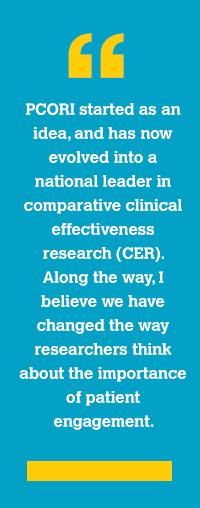
Christine Goertz, D.C., Ph.D. Outgoing Chair, PCORI Board of Governors
After serving on the Patient-Centered Outcomes Research Institute (PCORI) Board of Governors for 12 years, Dr. Christine Goertz, D.C., Ph.D., will be leaving the Board at the end of September 2022. Given that the needs of the PCORI Board of Governors significantly overlap with the expertise and interests of AACIPM’s many participants, we took a moment to talk with Dr. Goertz about her time with the Board, PCORI’s role in the future of health policy, and why others should consider getting involved.
To fill Dr. Goertz’ seat, along with several others, the U.S. Government Accountability Office (GAO) is accepting nominations for a number of Board seats, including: a surgeon, a state-licensed integrative health care practitioner, a representative of patients and health care consumers, a representative of device manufacturers or developers, a representative of pharmaceutical manufacturers or developers, and a representative of private payers who represents health insurance issuers. The GAO will accept letters of nomination and resumes sent via email to PCORI@gao.gov no later than May 10, 2022.
 AACIPM: What was it like for you to be involved with PCORI in the past dozen years?
AACIPM: What was it like for you to be involved with PCORI in the past dozen years?
Dr. Goertz: It has been a tremendous honor to serve on the Board of Governors since PCORI’s founding in 2010. PCORI started as an idea, and has now evolved into a national leader in comparative clinical effectiveness research (CER). Along the way, I believe we have changed the way researchers think about the importance of patient engagement. PCORI is unique in its emphasis on patients in all of our work, including the research we fund. Our particular focus is helping people to make sense of the many options they face when navigating the health care system. To that end, PCORI is intentional about seeking out an array of views – this culture of inclusion has earned PCORI the support and respect of a wide range of health care stakeholders.
PCORI-funded research is producing evidence that informs health care decisions for a range of high-cost and high-burden conditions and care. These include COVID-19, mental health care, health screenings for cancer and other conditions, opioid use disorder and pain care, antibiotic stewardship, and more. We are also leading culture change in health research, through initiatives that center research on outcomes important to the patient and their family, promote health equity, and generate findings using real-world data.
AACIPM: How has PCORI changed in that time?
Dr. Goertz: The original 21-member Board of Governors began PCORI’s work in 2010 with a congressional mandate and a shared commitment towards the conduct and dissemination of patient-centered comparative effectiveness research. Since that time, we have invested more than $3.4 billion in CER and research-related projects and activities. While doing so, we redefined and set the standard for patient engagement in research. Evidence from PCORI-funded studies is helping patients with decision making and impacting clinical practice. In addition, PCORI’s work has influenced changes in the culture of research as more funders and research institutions use our work as a model to implement new approaches to engaging patients and healthcare stakeholders in the research process.
AACIPM: As the outgoing PCORI Chair, what do you see for its future?
Dr. Goertz: I could not be more excited about PCORI’s future. We are incredibly fortunate to have an outstanding Board of Governors and a talented staff led by our dynamic Executive Director, Dr. Nakela Cook. Working together as a team, we have set forth five new National Priorities for Health and a Research Agenda that signal an evolved approach that ensures PCORI’s funding of CER will be even more relevant to our nation’s critical health issues now and in the future. These critical documents were developed with substantial input from stakeholders – including representatives of AACIPM member organizations. As we look to the future, PCORI will strengthen existing partnerships, and develop new ones, across multiple sectors for engaged research approaches and to facilitate the uptake of relevant research results.
It is important to note the evolution of PCORI’s National Priorities from a focus on research to a broader focus on health. This change recognizes the larger context of patients’ lives that influence their health—including the impact of social determinants of health that are often significant drivers of health care and health outcomes. With its focus on patient-centered CER that addresses the practical questions of which care options work best for different people, needs, and circumstances, PCORI is uniquely positioned to provide needed real-world evidence to support improved decision making.
I would note that health equity is both one of the five National Priorities for Health and is interwoven throughout all of PCORI’s work, representing a renewed commitment to make a positive impact on this major challenge facing the nation.
AACIPM: Can you share examples of funding that is relevant to the work of AACIPM and its participants and/or you are especially proud of?
Dr. Goertz: There are countless examples of relevant funding studies that have had tremendous impact on patients and stakeholders.
One that comes to my mind is the PCORI-funded TARGET Trial, a study of patients with acute low back pain who were identified at baseline as having different risks for developing chronic pain. This study found that between 20% (low risk) and 33% (moderate risk) of patients developed chronic low back pain and that a significant number of patients received tests and treatments that were not consistent with guidelines, such as imaging and opioids.
Another example: People with limited education and low literacy bear a greater burden of chronic pain and yet often have lesser access to effective pain education and CBT. A PCORI-funded study found that CBT and education materials adapted for underserved populations gave better results — less pain and better physical function – than usual chronic pain care with standard materials and CBT.
AACIPM: Regarding the open positions and what you know about the current makeup of the Board, what contributions/expertise do you think would be most valuable to the PCORI board?
Dr. Goertz: PCORI has always benefited from hearing from a wide range of voices and perspectives. I believe, what is most important of course is a respect for patients, who are at the center of all of PCORI’s work. The GAO will accept letters of nomination and resumes sent via email to PCORI@gao.gov no later than May 10, 2022. If this is of interest, more information is available here and I would encourage you to also visit pcori.org to learn more about the organization and our impact.
AACIPM: Anything else important you’d like to share?
Dr. Goertz: Serving on the PCORI Board of Governors over the past 12 years has been an incredible honor. PCORI-funded research is a significant value-add to the nation and communities we serve, and its impact will only grow over time. Rooted in PCORI’s DNA is a recognition that different people in different circumstances will want and need different approaches to care. It is critically important that evidence-based integrative health and integrated pain management be part of that process.
I would encourage those interested in learning more about PCORI’s work in integrative pain management specifically or patient-centered CER more generally to visit the PCORI website to learn more here.